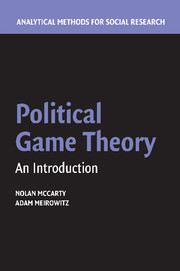Book contents
- Frontmatter
- Contents
- Acknowledgments
- 1 Introduction
- 2 The Theory of Choice
- 3 Choice Under Uncertainty
- 4 Social Choice Theory
- 5 Games in the Normal Form
- 6 Bayesian Games in the Normal Form
- 7 Extensive Form Games
- 8 Dynamic Games of Incomplete Information
- 9 Repeated Games
- 10 Bargaining Theory
- 11 Mechanism Design and Agency Theory
- 12 Mathematical Appendix
- Bibliography
- Index
1 - Introduction
Published online by Cambridge University Press: 05 June 2012
- Frontmatter
- Contents
- Acknowledgments
- 1 Introduction
- 2 The Theory of Choice
- 3 Choice Under Uncertainty
- 4 Social Choice Theory
- 5 Games in the Normal Form
- 6 Bayesian Games in the Normal Form
- 7 Extensive Form Games
- 8 Dynamic Games of Incomplete Information
- 9 Repeated Games
- 10 Bargaining Theory
- 11 Mechanism Design and Agency Theory
- 12 Mathematical Appendix
- Bibliography
- Index
Summary
In a rather short period of time, game theory has become one of the most powerful analytical tools in the study of politics. From their earliest applications in electoral and legislative behavior, game theoretic models have proliferated in such diverse areas as international security, ethnic cooperation, and democratization. Indeed all fields of political science have benefited from important contributions originating in game theoretic models. Rarely does an issue of the American Political Science Review, the American Journal of Political Science, or International Organization appear without at least one article formulating a new game theoretic model of politics or one providing an empirical test of existing models.
Nevertheless, applications of game theory have not developed as fast in political science as they have in economics. One of the consequences of this uneven development is that most political scientists who wish to learn game theory are forced to rely on textbooks written by and for economists. Although there are many excellent economic game theory texts, their treatments of the subject are often not well suited to the needs of political scientists. First and perhaps most important, the applications and topics are generally those of interest to economists. For example, it is not always obvious to novice political scientists what duopoly or auction theory tells us about political phenomena. Second, there are topics such as voting theory that are indispensable to political game theorists but receive scant coverage in economics texts.
- Type
- Chapter
- Information
- Political Game TheoryAn Introduction, pp. 1 - 5Publisher: Cambridge University PressPrint publication year: 2007

